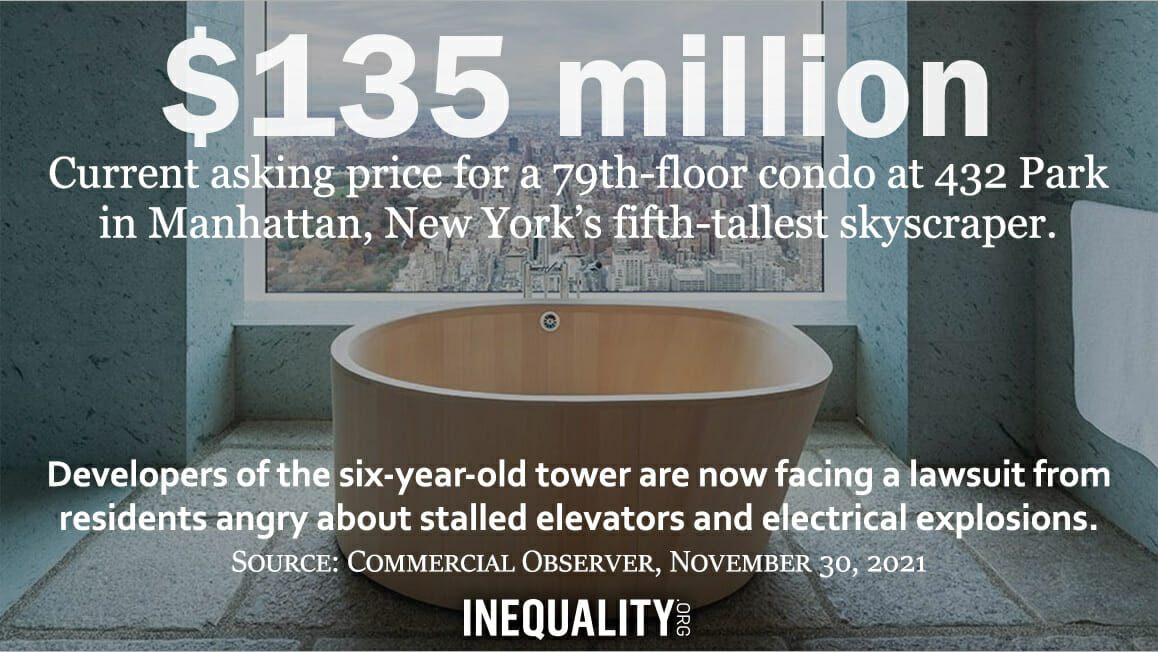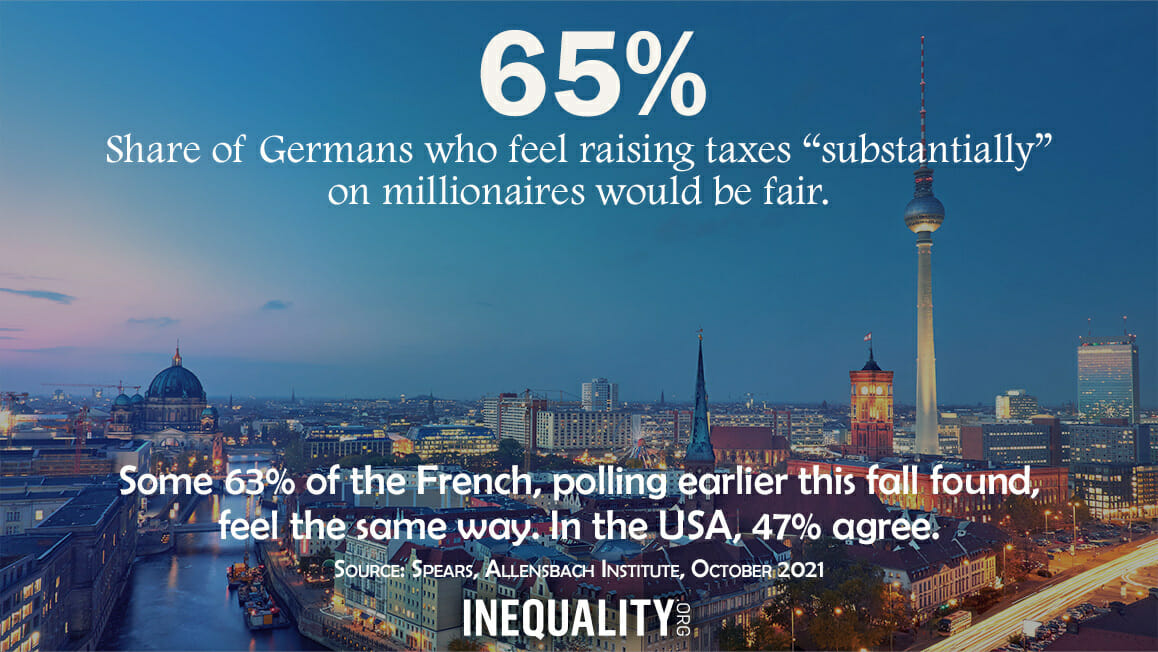| THIS WEEK |
You may notice a common theme in this week's issue: greed.
Greedy CEOs and corporations that take advantage of a global pandemic to hike up prices on everyday Americans. Greedy nations that hoard Covid-19 vaccine patents while poorer nations suffer. Greedy bosses who refuse to reward hard work with a living wage.
All these phenomena signal where we are as a society. And so do the basic stats, as we detail in this issue. Since 2019, the wealth of America's top 1 percent has jumped a stunning seven times faster than the net worth of our poorest 50 percent.
So how do we rein in the greed that's so deepening our inequality? We can't pull off that reining in overnight — or with any one piece of legislation. But the Build Back Better bill currently working its way through Congress does amount to a down payment on a bold, transformative economic justice agenda. Let's just not forget that the bill amounts to only that: a down payment. We have work ahead. Plenty of it.
Chuck Collins and Rebekah Entralgo,
for the Institute for Policy Studies Inequality.org team
|
|
| |
|
| INEQUALITY BY THE NUMBERS |
 |
|
|
|
| |
|
| FACES ON THE FRONTLINES |
 |
| Inside the Largest Strike in the Entire United States |
| Whether teaching, grading, or stewarding labs, student workers perform essential labor at our nation's institutions of higher ed. Yet many students receive paltry benefits and not enough in their paychecks to make ends meet. To remedy these shortfalls, over 3,000 student workers organized with UAW 2110 at Columbia University in New York have embarked on what currently rates as the largest strike in the country. The strikers want a living wage and adequate health insurance. They calculate that their core demands would cost Columbia only half of a percent of the university's net assets, a stash that jumped by $3.3 billion in 2021, a 20 percent increase. Columbia student Bella DeVaan has more. |
|
| |
|
| WORDS OF WISDOM |
 |
|
|
|
| |
|
PETULANT PLUTOCRAT
OF THE WEEK |
 |
| Raking in an Eight-Digit Paycheck, $1.25 at a Time |
| Anybody want to buy a ton of "Everything's $1 signs? The Dollar Tree discount chain, after 35 years of selling nothing over $1, has just announced that prices will be rising — permanently — 25 percent in all the company's 8,000 U.S. stores. Dollar Tree CEO Michael Witynski is blaming inflation for this "monumental step." Hiking prices, he says, will give the company "greater flexibility to manage the overall business, especially in a volatile, inflationary environment." Shoppers, Witynski insists, "are responding favorably" to the price hike. Would that reaction change if more Dollar Tree shoppers had a chance to ponder the company's latest numbers? Dollar Tree has registered $1.23 billion in profits over the past year. Witynski personally collected $10,767,883 last year for his services. His workers, the U.S. Senate Budget Committee staff director points out, make as "little as $8.32 an hour."" |
|
| |
|
| BOLD SOLUTIONS |
 |
| Let's Put the Blame for Inflation Where It Belongs |
| From newspaper headlines to cable news chyrons, news about increased inflation has become inescapable. Who really deserves the blame for the rising cost of everything from groceries to cars? Faulting politicians can be easy, but that also gives a free pass to our corporate giants and the ultra rich who run them. These greedy corporations are exploiting economic hardship, leaving workers and families to pay the price. Our lawmakers need to step up and hold our corporate executive class accountable. Sarah Baron, the campaign director at Tax March, has some ideas on how. |
|
| |
|
| GREED AT A GLANCE |
 |
|
|
|
| |
|
| TOO MUCH |
 |
| Might Starbucks Soon Start Sharing the Bucks? |
| The current Starbucks CEO, Kevin Johnson, last year took home 1,211 times more compensation than the company's most typical employee, a part-time barista annually making $12,113. In effect, Johnson earned more in compensation before his first morning coffee break of 2020 than the most typical Starbucks employee made from an entire 12 months of labor. The baristas of Buffalo in upstate New York have a better idea. At three Starbucks outlets in the Buffalo area, they've been organizing to become “the first corporate-owned Starbucks in the country to unionize. Inequality.org co-editor Sam Pizzigati has more. |
|
|
|
| |
|
| MUST READS |
|
This week on Inequality.org
Peter Certo, Greed Is Prolonging the Pandemic. The longer it takes the world to get vaccinated, the more variants we'll see.
Elsewhere on the Web
Anthony Faiola, At Miami's Art Basel, a canvas of global inequality in the pandemic age, Washington Post. Miami's latest annual art show marks a post-Covid coming out party for the global mega-rich.
Sridhar Natarajan, Goldman's Leaders Push New, Creative Ways to Juice Their Own Pay, Bloomberg. Our biggest banks seem to believe they're underpaying execs reeling in over $20 million a year.
Richard Kahlenberg, Polite, Legal, and Unacknowledged: The Devastating Biases of Well-Heeled Suburbia, American Prospect. Build Back Better highlights how upper-income whites engage in discrimination every bit as harmful as that ascribed to working-class whites — and aims to stop it.
Luca Visentini, Nicola Countouris, and Philippe Pochet, Structural solutions for structural inequalities — a trade union perspective, Social Europe. Responses to the pandemic have upended the idea that "there is no alternative" to policies engendering widening inequality.
Matthew Goodwin, Public opinion is turning against the ultra-wealthy, Spears. A full 50 per cent of Americans aged 18-29 now see billionaires as a "bad thing for the country," up from 39 percent in 2020. This compares to only 19 percent of over-65s.
David Pilling, What South Africa and Omicron tell us about inequality, Financial Times. Stark economic gaps, both within nations and between them, once again turn out to be just swell for pathogens.
Alan Blinder, Big Contracts, Big Buyouts, Big Pressure: College Football Coaches Hit the Jackpot, New York Times. The latest blur of coaching contracts, collectively worth hundreds of millions of dollars, comes amid accusations that colleges are exploiting athletes who cannot earn salaries for actually playing the games.
|
|
| |
|
| A FINAL FIGURE |
 |
|
|
|
| |
|
| BE THE 1% (NO, NOT THAT 1%) |
 |
Our goal for 2021: that 1% of our Inequality.org subscribers become monthly sustainers and help grow our newsletter and research efforts. Be the 1%, for as little as $3 a month! |
|
|
|
| |
|
|